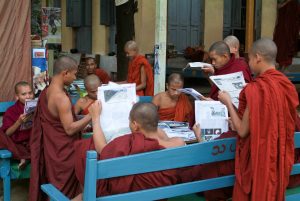Today, May 3, thousands of netizens are marking World Press Freedom Day by tweeting out, among several hashtags, the slogan #JournalismIsNotACrime. I don’t know who came up with the slogan, but it has always struck me as slightly inadequate. For a profession that deals in the written word, it exhibits a clumsy degree of semantic slippage, from the “ought” to the “is.” While journalism shouldn’t be a crime, there are of course many nations in which journalism very much is a crime, and for quite unsurprising reasons.
Take Myanmar, where since the military coup of February 1, the country’s junta has arrested an estimated 73 journalists and media workers, slamming shut the door that creaked on its hinges and swung open during the political liberalization of the past decade.
According to the Committee to Protect Journalists (CPJ), at least 40 of them remained behind bars as of April 28. Shawn Crispin, CPJ’s senior Southeast Asia representative, said in a statement that with the coup, Myanmar “has almost overnight become one of the worst jailers of journalists worldwide.”
According to CPJ, the majority of those arrested were detained during newsroom raids or while covering the country’s rolling anti-coup street protests. All but two of the detainees are local journalists working for some of the dozens of local outlets that sprang up, from Kachin State to Tanintharyi Region, during the 2010s.
More than half of those detained have since been charged under Article 505(a) of Myanmar’s antique Penal Code, which criminalizes the dissemination of misinformation or “fake news” that could agitate or cause security forces or officials to mutiny. The charge carries punishments of up to three years imprisonment. The handling of their cases has been predictably slipshod, with many of those arrested denied access to a lawyer or family members.
The crackdown has effectively curtailed the period of relative openness that began in earnest in 2012, with the abolition of the country’s old system of pre-publication censorship. Since the coup, the junta has revoked the operating licenses of five privately run news outlets – Mizzima, Myanmar Now, 7Day News, the Democratic Voice of Burma, and Khit Thit Media – that flourished in the more open environment of the reform years.
In its most recent World Press Freedom Index, Reporters Without Borders remarked that the coup has “set Myanmar’s journalists back ten years,” driving many back underground. “Journalists are living in fear because there is no safety for us,” a senior editor from a Myanmar news agency told Radio Free Asia this week. “The flow of news in this country has almost stopped.”
The arrest of journalists and the withdrawal of media licenses has taken place on a spectrum of repression that has also involved nightly internet blackouts, and, starting in early April, the shutdown of mobile internet services across the country. This reflects the realities of a digitally networked public sphere in which the line between professional journalist and the bystander posting videos to social media has become blurred.
The fierce press crackdown, and the concomitant internet blackouts, represent the junta’s recognition of the fact that for networked social movements like Myanmar’s anti-coup campaign, “attention is oxygen,” whether it is captured by traditional media outlets or from smartphone-toting citizen journalists. The junta’s crackdown is therefore a crude and egregious but otherwise predictable counterpart of its attempt to defend its coup and crush the popular resistance in the streets.
In this context, the homilies to the importance of a free press that are common on World Press Freedom Day exist in an altogether different universe from the cloistered confines of the Tatmadaw high command. Journalism is undoubtedly “a cornerstone of democratic societies and a source of legitimacy that should be unconditionally preserved and guaranteed,” to quote the statement put out by 17 foreign diplomatic missions in Myanmar today. But does anyone believe that Myanmar’s military, which has now killed at least 765 people in defense of its putsch, has a genuine interest in anything of the kind?
In an important way, the #JournalismIsNotACrime slogan undersells the power and potential of the press, both to threaten entrenched economic and political interests and, as the old saying runs, “to afflict the comfortable and comfort the afflicted.” While journalism clearly shouldn’t be criminalized, the fact that Myanmar’s junta is treating it as a criminal act actually functions as a brutal and backhanded acknowledgment of the nation’s brave and besieged journalists, whose work will be essential to the construction of a truly democratic Myanmar.
































